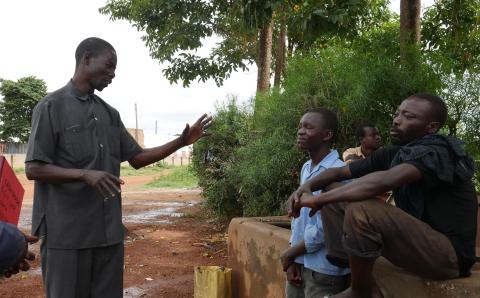If you want to go quickly, go alone. If you want to go far, go together.
I don’t recall the first time I heard this African proverb, but I often need its reminder. This proverb is also supported by Scripture. First Corinthians 12 reminds us that the “eye cannot say to the hand, ‘I don’t need you!’ and the head cannot say to the feet, ‘I don’t need you!’”
In the preceding verses we’re given an important lesson:
There are different kinds of gifts, but the same Spirit distributes them. There are different kinds of service, but the same Lord. There are different kinds of working, but in all of them and in everyone it is the same God at work. Now to each one the manifestation of the Spirit is given for the common good.
Despite knowing this, I struggle to follow these words of wisdom. Perhaps it’s because of my DNA or my North American upbringing but, left to my own devices, many times I’d rather go quickly and do it myself. And I’m not alone.
Working together is not usually the first preference for many of us—even in the church. Look at the rise of nondenominational, independent churches. Rather than being hampered by being part of a larger group, an independent church is free to zoom forward quickly, not stopping to consider whether it needs other hands or feet.
Recall the congregational meetings you’ve attended where tough discussions result in local priorities being given financial increases while funding for denominational commitments is decreased.
Truly these examples can rest upon seemingly valid justifications. Why would we want to wait around for a classis meeting or a synodical decision when we’re able to step right now into an opportunity before us? Why contribute to a broader ministry effort when the needs in our own community are so compelling?
My purpose is not to second-guess these decisions. I do not want to “guilt” any congregation into increasing their financial commitment to the denomination, nor do I want to suggest there’s not an urgency in sharing the gospel message—nearby or faraway. Rather, my purpose is to remind us all of the importance of life in the Body.
Do I have any evidence that we sometime forget?
Exhibit A. In the 500 years since the Reformation, the Protestant church has split and split and split. Today there are at least 140 denominations around the world that claim a Reformed or Presbyterian identity.
Exhibit B. At times congregations experiencing great blessings in membership and resources take small steps or one giant step away from denominational commitments. You can probably name a situation in your community.
Some attribute this trend to the rising generation of millennials who want to be unattached to organized politics and religion and are distrustful of institutions. But in every generation we can identify occasions and situations where the desire to go solo—to not work together—is present.
Instead of longing for the good old days, the challenge for us today is how to be the body of Christ in our current contexts. Some of us are members of Facebook groups in which growth in Christ and his body are the goals. Others are finding places to be the body of Christ in unexpected places—city sidewalks, local breweries, or motorcycle groups.
My challenge to the Christian Reformed church is for us to move together in order to be faithful to God’s call upon us as the body of Christ. I admit that moving deliberately together may require reminders to speed up, simplify structures, and create a nimble culture. Let’s be honest, we also need cues to stick together. But as it is, God arranged the members in the body. . . .
About the Author
Steven Timmermans served as the executive director of the Christian Reformed Church in North America from 2014 to 2020.
Steven Timmermans se desempeñó como director ejecutivo de la Iglesia Cristiana Reformada en América del Norte de 2014 a 2020.
Steven Timmermans는 2014 년부터 2020 년까지 북미에서 기독교 개혁 교회의 집행 이사로 재직했습니다.








